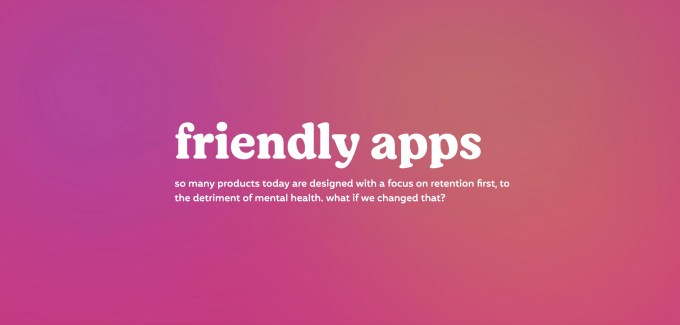Friendly Apps nabs $3M for apps that improve well-being (original) (raw)
Longtime engineer and product designer Michael Sayman has been building apps since he was a kid, landing him roles at Facebook, Google, Roblox and, most recently, Twitter, where he’s often been tasked with developing products aimed at a teenage audience. Sayman was only 17 when he joined Facebook, but had already built several apps — an experience documented in his book “App Kid.” Over the years, Sayman contributed to high-profile products like Instagram Stories, WhatsApp Status, YouTube Shorts and the Roblox Graph, among others. Now, Sayman is looking to leverage his understanding of what users want from their apps with the launch of his new startup, Friendly Apps.
The startup’s thesis is that his generation, Gen Z, understands that many of the social apps that have been built to date can be toxic to users’ health and can prevent people from accomplishing their true goals. Friendly Apps’ mission is to create a suite of apps with a different set of values that are targeted toward helping people with both their physical and mental health in new ways.
Prior to starting Friendly Apps, Sayman was working at Twitter. In fact, the founder had just joined Twitter in March, where he intended to aid the social network by building out new product experiences for teens via its 0–>1 team.
But after the Elon Musk acquisition deal was announced, internal product development efforts slowed down, he says. That situation gave him a push to finally break out of Big Tech to work on his own thing.
“It takes a billionaire trying to acquire a company that I worked at for me to finally go and do this,” Sayman says, with a laugh.
The idea for Friendly Apps is something he’s had in the back of his mind for years as he’s seen how tech companies developed their products.
“A lot of social media products use retention tactics that slowly deteriorate the well-being and mental health of their users because of the way they’re designed,” explains Sayman. The companies encouraged the wrong behaviors from their users, and have become popular because they’re addictive, he says.
“They have tactics to keep people coming in.”
He suggests the problem lies not only with the product design, but also with the internal goals and metrics companies pursue.
“The structures and the incentives within a lot of these social media companies are not set up in a way to encourage longer-term thinking around the well-being of the person that’s using the product,” Sayman notes. “If somebody is not doing well on the platform…if they’re feeling anxious, depressed or insecure, over time, they’ll stop using the product. They’ll try to find other avenues or other ways of communicating or connecting with the people they care about through some other means,” he says.

Image Credits: Michael Sayman (opens in a new window)
Sayman wants Friendly Apps to be different. Although the startup will take the learnings from social apps and products he’s helped create for teens, its apps won’t be solely aimed at Gen Z users.
As for the apps themselves, they haven’t yet been created. Despite that fact, the startup raised a seed round of $3 million in about a week’s time. It seems a lot of people were willing to bet on Sayman, starting with Weekend Fund’s Ryan Hoover, founder of Product Hunt.
“I’ve known Michael for eight years. It was clear that he would eventually start his own company. He has a very rare ability to deeply intuit human behavior, translate his ideas into clean design and build quickly,” says Hoover. “We committed to invest pre-product, pre-deck.”
Sayman does have a few different product ideas, however. He envisions one app could be focused on helping people achieve their physical fitness goals — even if they’re not a regular gym-goer or runner, or some other kind of hardcore fitness advocate.
Another app could help people remember to prioritize their real-world relationships and encourage them to spend time with people they care about in the physical world.
“Everyone’s doing so many things that we don’t actually end up catching up in person for a while,” Sayman says.
As time goes by, friendships can deteriorate as people know less and less about each other, which can impact mental health. Today’s social apps don’t help — they only further isolate us, he explains. Instead, we end up experiencing relationships through “a little tiny window of filtered photos,” he notes.
“We didn’t evolve to live that way — like we all do right now,” says Sayman. “So I think a lot of the mental health issues that we start seeing, in particular with younger generations, come as a result of a lot of that isolation and that ‘tiny window’ view of the world.”
The founder also plans to bring his worldview as a second-generation Latino immigrant into Friendly Apps’ product experiences, seeing the potential to help address specific hurdles that new immigrants to the U.S. may need to overcome.

Image Credits: Friendly Apps
But these sorts of concepts may or may not be among the first apps to launch. Instead, the startup plans to test a suite of products, experiences, features and even various design elements before bringing anything to the public.
Sayman can build apps quickly. But as a sole founder, he will still need some time to get the products off the ground and tested. He hopes to have something released to the public in around six months, he says.
Seed investors in Friendly Apps include BoxGroup, Weekend Fund, Shrug Capital, Day One Ventures, Betaworks Ventures, SRB Ventures, 305 Ventures and CoreVentures, plus founders and operators from Snap, TikTok, Instagram, Meta, Google, Tesla, Things and others.
The company also wants to include the perspectives of those outside Silicon Valley, Sayman says.
One angel investor, Hayley Leibson, told TechCrunch she was “extremely happy that Michael prioritized bringing onboard womxn angel investors like myself, and others including teachers, mothers, students and immigrants from diverse backgrounds.”
“The tech industry doesn’t really gather a lot of investors from places that aren’t the tech industry,” Sayman points out. “If we’re thinking about how to make products that help people’s mental health and help people’s physical well-being…I think we can have opinions, feedback and input directly from people who aren’t in the tech world.”